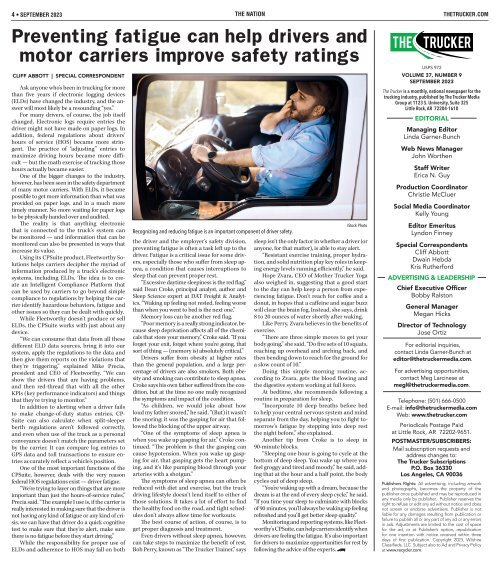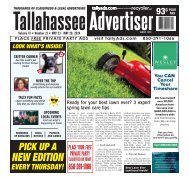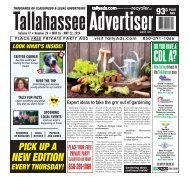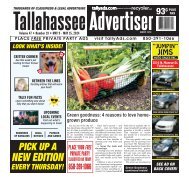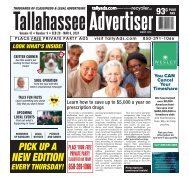You also want an ePaper? Increase the reach of your titles
YUMPU automatically turns print PDFs into web optimized ePapers that Google loves.
4 • SEPTEMBER 2023 THE NATION<br />
Preventing fatigue can help drivers and<br />
motor carriers improve safety ratings<br />
CLIFF ABBO<strong>TT</strong> | SPECIAL CORRESPONDENT<br />
Ask anyone who’s been in trucking for more<br />
than five years if electronic logging devices<br />
(ELDs) have changed the industry, and the answer<br />
will most likely be a resounding “yes.”<br />
For many drivers, of course, the job itself<br />
changed. Electronic logs require entries the<br />
driver might not have made on paper logs. In<br />
addition, federal regulations about drivers’<br />
hours of service (HOS) became more stringent.<br />
The practice of “adjusting” entries to<br />
maximize driving hours became more difficult<br />
— but the math exercise of tracking those<br />
hours actually became easier.<br />
One of the bigger changes to the industry,<br />
however, has been seen in the safety department<br />
of many motor carriers. With ELDs, it became<br />
possible to get more information than what was<br />
provided on paper logs, and in a much more<br />
timely manner. No more waiting for paper logs<br />
to be physically handed over and audited.<br />
The reality is that anything electronic<br />
that is connected to the truck’s system can<br />
be monitored — and information that can be<br />
monitored can also be presented in ways that<br />
increase its value.<br />
Using its CPSuite product, Fleetworthy Solutions<br />
helps carriers decipher the myriad of<br />
information produced by a truck’s electronic<br />
systems, including ELDs. The idea is to create<br />
an Intelligent Compliance Platform that<br />
can be used by carriers to go beyond simple<br />
compliance to regulations by helping the carrier<br />
identify hazardous behaviors, fatigue and<br />
other issues so they can be dealt with quickly.<br />
While Fleetworthy doesn’t produce or sell<br />
ELDs, the CPSuite works with just about any<br />
device.<br />
“We can consume that data from all these<br />
different ELD data sources, bring it into our<br />
system, apply the regulations to the data and<br />
then give them reports on the violations that<br />
they’re triggering,” explained Mike Precia,<br />
president and CEO of Fleetworthy. “We can<br />
show the drivers that are having problems,<br />
and then red-thread that with all the other<br />
KPIs (key performance indicators) and things<br />
that they’re trying to monitor.”<br />
In addition to alerting when a driver fails<br />
to make change-of-duty status entries, CP-<br />
Suite can also calculate when split-sleeper<br />
berth regulations aren’t followed correctly,<br />
and even when use of the truck as a personal<br />
conveyance doesn’t match the parameters set<br />
by the carrier. It can compare log entries to<br />
GPS data and toll transactions to ensure entries<br />
accurately reflect a vehicle’s position.<br />
One of the most important functions of the<br />
CPSuite, however, deals with the very reason<br />
federal HOS regulations exist — driver fatigue.<br />
“We’re trying to layer on things that are more<br />
important than just the hours-of-service rules,”<br />
Precia said. “The example I use is, if the carrier is<br />
really interested in making sure that the driver is<br />
not having any kind of fatigue or any kind of crisis,<br />
we can have that driver do a quick cognitive<br />
test to make sure that they’re alert, make sure<br />
there is no fatigue before they start driving.”<br />
While the responsibility for proper use of<br />
ELDs and adherence to HOS may fall on both<br />
Recognizing and reducing fatigue is an important component of driver safety.<br />
the driver and the employer’s safety division,<br />
preventing fatigue is often a task left up to the<br />
driver. Fatigue is a critical issue for some drivers,<br />
especially those who suffer from sleep apnea,<br />
a condition that causes interruptions to<br />
sleep that can prevent proper rest.<br />
“Excessive daytime sleepiness is the red flag,”<br />
said Dean Croke, principal analyst, author and<br />
Sleep Science expert at DAT Freight & Analytics.<br />
“Waking up feeling not rested, feeling worse<br />
than when you went to bed is the next one.”<br />
Memory loss can be another red flag.<br />
“Poor memory is a really strong indicator, because<br />
sleep deprivation affects all of the chemicals<br />
that store your memory,” Croke said. “If you<br />
forget your exit, forget where you’re going, that<br />
sort of thing — (memory is) absolutely critical.”<br />
Drivers suffer from obesity at higher rates<br />
than the general population, and a large percentage<br />
of drivers are also smokers. Both obesity<br />
and smoking can contribute to sleep apnea.<br />
Croke says his own father suffered from the condition,<br />
but at the time no one really recognized<br />
the symptoms and impact of the condition.<br />
“As children, we would joke about how<br />
loud my father snored,” he said. “(But) it wasn’t<br />
the snoring; it was the gasping for air that followed<br />
the blocking of the upper airway.<br />
“One of the symptoms of sleep apnea is<br />
when you wake up gasping for air,” Croke continued.<br />
“The problem is that the gasping can<br />
cause hypotension. When you wake up gasping<br />
for air, that gasping gets the heart pumping,<br />
and it’s like pumping blood through your<br />
arteries with a shotgun.”<br />
The symptoms of sleep apnea can often be<br />
reduced with diet and exercise, but the truck<br />
driving lifestyle doesn’t lend itself to either of<br />
those solutions. It takes a lot of effort to find<br />
the healthy food on the road, and tight schedules<br />
don’t always allow time for workouts.<br />
The best course of action, of course, is to<br />
get proper diagnosis and treatment.<br />
Even drivers without sleep apnea, however,<br />
can take steps to maximize the benefit of rest.<br />
Bob Perry, known as “The Trucker Trainer,” says<br />
iStock Photo<br />
sleep isn’t the only factor in whether a driver (or<br />
anyone, for that matter), is able to stay alert.<br />
“Resistant exercise training, proper hydration,<br />
and solid nutrition play key roles in keeping<br />
energy levels running efficiently,” he said.<br />
Hope Zvara, CEO of Mother Trucker Yoga<br />
also weighed in, suggesting that a good start<br />
to the day can help keep a person from experiencing<br />
fatigue. Don’t reach for coffee and a<br />
donut, in hopes that a caffeine and sugar buzz<br />
will clear the brain fog. Instead, she says, drink<br />
8 to 20 ounces of water shortly after waking.<br />
Like Perry, Zvara believes in the benefits of<br />
exercise.<br />
“There are three simple moves to get your<br />
body going,” she said. “Do five sets of 10 squats,<br />
reaching up overhead and arching back, and<br />
then bending down to reach for the ground for<br />
a slow count of 10.”<br />
Doing this simple morning routine, according<br />
to Zvara, gets the blood flowing and<br />
the digestive system working at full force.<br />
At bedtime, she recommends following a<br />
routine in preparation for sleep.<br />
“Incorporate 10 deep breaths before bed<br />
to help your central nervous system and mind<br />
separate from the day, helping you to fight tomorrow’s<br />
fatigue by stepping into deep rest<br />
the night before,” she explained.<br />
Another tip from Croke is to sleep in<br />
90-minute blocks.<br />
“Sleeping one hour is going to cycle at the<br />
bottom of deep sleep. You wake up where you<br />
feel groggy and tired and moody,” he said, adding<br />
that at the hour and a half point, the body<br />
cycles out of deep sleep.<br />
“You’re waking up with a dream, because the<br />
dream is at the end of every sleep cycle,” he said.<br />
“If you time your sleep to culminate with blocks<br />
of 90 minutes, you’ll always be waking up feeling<br />
refreshed and you’ll get better sleep quality.”<br />
Monitoring and reporting systems, like Fleetworthy’s<br />
CPSuite, can help carriers identify when<br />
drivers are feeling the fatigue. It’s also important<br />
for drivers to maximize opportunities for rest by<br />
following the advice of the experts. 8<br />
USPS 972<br />
Volume 37, Number 9<br />
September 2023<br />
Thetrucker.com<br />
The Trucker is a monthly, national newspaper for the<br />
trucking industry, published by The Trucker Media<br />
Group at 1123 S. University, Suite 325<br />
Little Rock, AR 72204-1610<br />
EDITORIAL<br />
Managing Editor<br />
Linda Garner-Bunch<br />
Web News Manager<br />
John Worthen<br />
Staff Writer<br />
Erica N. Guy<br />
Production Coordinator<br />
Christie McCluer<br />
Social Media Coordinator<br />
Kelly Young<br />
Editor Emeritus<br />
Lyndon Finney<br />
Special Correspondents<br />
Cliff Abbott<br />
Dwain Hebda<br />
Kris Rutherford<br />
ADVERTISING & Leadership<br />
Chief Executive Officer<br />
Bobby Ralston<br />
General Manager<br />
Megan Hicks<br />
Director of Technology<br />
Jose Ortiz<br />
For editorial inquiries,<br />
contact Linda Garner-Bunch at<br />
editor@thetruckermedia.com.<br />
For advertising opportunities,<br />
contact Meg Larcinese at<br />
megl@thetruckermedia.com.<br />
Telephone: (501) 666-0500<br />
E-mail: info@thetruckermedia.com<br />
Web: www.thetrucker.com<br />
Periodicals Postage Paid<br />
at Little Rock, AR 72202-9651.<br />
POSTMASTER/SUBSCRIBERS:<br />
Mail subscription requests and<br />
address changes to:<br />
The Trucker Subscriptions<br />
P.O. Box 36330<br />
Los Angeles, CA 90036<br />
Publishers Rights: All advertising, including artwork<br />
and photographs, becomes the property of the<br />
publisher once published and may be reproduced in<br />
any media only by publisher. Publisher reserves the<br />
right to refuse or edit any ad without notice and does<br />
not screen or endorse advertisers. Publisher is not<br />
liable for any damages resulting from publication or<br />
failure to publish all or any part of any ad or any errors<br />
in ads. Adjustments are limited to the cost of space<br />
for the ad, or at Publisher’s option, republication<br />
for one insertion with notice received within three<br />
days of first publication. Copyright 2023, Wilshire<br />
Classifieds, LLC. Subject also to Ad and Privacy Policy<br />
at www.recycler.com.


